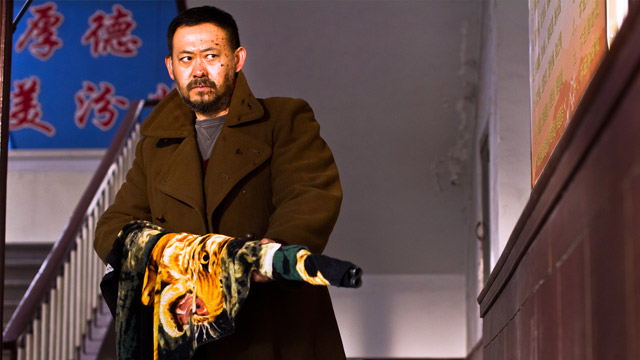How China Made Sure There'd Be No 'Touch of Sin' at the Oscars

Jiang Wu in 'A Touch of Sin.'
On January 3, the film critics of The New York Times published their Oscar nominations wish list. Many of their wishes came true and on Sunday night the Academy of Motion Picture Arts and Sciences will broadcast its annual celebration of Hollywood and bestow golden statuettes on the handful of films its members voted the best made in 2013.
Missing from the party will be one film that two of the three leading Times critics claimed was deserving not only of a nomination for Best Picture but also was so good that its Chinese maker should get a shot at winning the Best Director award.
The film, A Touch of Sin, is a portrait of despair and violence ripped from newspaper headlines in modern China so close to home that censors there never cleared it for domestic distribution. Times critic Manohla Dargis called its director, Jia Zhangke, “one of the few filmmakers of any nationality who weighs the impact of social and political shifts on people—in every shot.” Colleague A.O. Scott also tipped Jia for Best Director and A Touch of Sin for Best Film. Dargis went further, suggesting nominations for Best Screenplay, Best Supporting Actor (Jiang Wu) and Best Supporting Actress (Zhao Tao). (You can watch Jia's September 2013 appearance at Asia Society in New York here.)
Jia’s writing did win the Best Screenplay award at the Cannes Film Festival in May. In September, A Touch of Sin premiered in the U.S. at the New York Film Festival and then distributor Kino Lorber tried out a limited release in big city America. But the film’s arresting and beautifully shot four-part story, was, for the most part, more than most U.S. audiences went in for, no surprise given that the typical American moviegoer just doesn’t do subtitles. Before long, Jia and Zhao were back in China, their brave work relegated to illegal bittorrent sites, pirated DVDs and museum retrospectives.
Film producers who have watched the rapid growth of Hollywood’s interest in China’s film industry (mostly for its ready cash and its hungry, growing moviegoing public) are not surprised by Jia’s absence from the Oscars. It takes considerable money and marketing muscle to sculpt a contender in the eyes of the Academy members who nominate and then vote on the Oscar winners, says Janet Yang, who, in 1986, was on the first Hollywood studio delegation to China after the Cultural Revolution.
“How often has a foreign-language film ever been nominated for Best Picture?” Yang asks, answering her own question. “Almost never.”
British director Danny Boyle’s sleeper hit Slumdog Millionaire won Best Picture in 2008 (and seven other Oscars), but only a small part of the film was in Hindi and Marathi. If a subtitled film ever was to have a true shot at a major-category Oscar it would be as a nominee for Best Foreign Language Film. Those films that stand a chance in that category are selected from a pool of official national submissions — films that have enjoyed lasting theatrical release in their home countries and the full support of their domestic industry leaders.
A Touch of Sin has thus far been denied an official release permit in China despite Jia and the Shanghai Film Studio behind him having worked closely with official censors from the get-go. If history is any guide, the denial is tantamount to a ban. Without a release in China, A Touch of Sin could not be submitted even for the Best Foreign Language Film prize. By censoring Chinese films to uphold the ruling Communist party's view of an appropriate cinematic portrayal of China, film authorities limit the country's chances of winning an Oscar.
This year, China’s official submission for the Best Foreign Language Film category was populist director Feng Xiaogang’s famine epic Back to 1942, and it failed to get nominated by members of the Academy. Following are all the Chinese-language films nominated Best Foreign Language Film over the years, including the one Oscar winner, notably not from China:
1990 — Ju Dou, by mainland directors Zhang Yimou and Yang Fengliang
1991 — Raise the Red Lantern, by mainland director Zhang's Hong Kong submission
1993 — Farewell My Concubine, mainland director Chen Kaige's Hong Kong submission
1993 — The Wedding Banquet, American director Ang Lee's Taiwan submission
1994 — Eat, Drink, Man, Woman, Lee, again for Taiwan
2000 — Crouching Tiger, Hidden Dragon, Lee's winner for Taiwan
2002 — Hero, by mainland director Zhang
With so few officially-approved films to choose from and submit for nomination it stands to reason that even fewer filmmakers from China have ever won any Oscar, let alone an Oscar in a major category. In fact, only one Chinese national ever has. Composer Tan Dun, from Changsha, Hunan, in central China, won the Oscar for Best Original Score for his music in Crouching Tiger Hidden Dragon, the 2000 Best Foreign Language film by Taiwan-born American director Ang Lee. By comparison, 15 films from Japan have been nominated and four have won the top honor awarded by the Academy, since 1947, for films with a predominantly non-English dialogue.
This year, there are two Oscar nominations for Greater China, both for Hong Kong director Wong Kar Wai’s The Grandmaster — one for for Best Cinematography, by Philippe Le Sourd, and the other for Best Costume Design, by William Chang Suk Ping.
Watch highlights from Jia Zhangke's September 2013 Asia Society appearance:
Watch the complete program:


